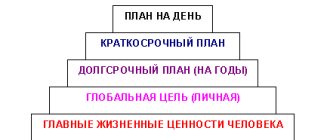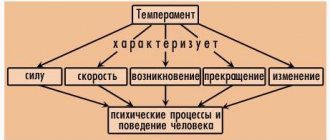Each person is an individual, with his own characteristics, character, life beliefs, goals and thoughts. To get to know him better, you need to get to know him better through communication. In the process, through facial expressions, gestures, demeanor, and the ability to listen, the level of his mental development and intelligence will be revealed.
These are two characteristics that reflect an individual's mental skills.
What is intelligence and mental development
They can definitely be improved and enhanced through self-improvement.
Mental development presupposes a complex of knowledge and skills that was formed in the process of obtaining them.
Translated from Latin - knowledge, understanding. And it means a set of needs for assessment, analysis and resolution of the situation. The term unites all human cognitive processes: memory, speech, thinking, imagination, attention, and perception.
It follows that human intelligence is a certain system of skills that allows one to adapt to new circumstances, the learning process, based on the experience gained, through which various existing life conditions are managed.
The term “intelligence” can be explained by three characteristics:
- Biological. This is the ability to consciously adapt to the situation;
- Educational. Ability for the learning process.
- Structural approach. Its author is Alfred Binet, a French psychologist. Intelligence is the ability to adapt means to achieve a goal. In other words, it is a set of specific skills.
We conclude that intelligence is determined by a large-scale ability to act intelligently, a rational thought process and skillfully overcoming life situations.
Intelligence from a psychological point of view
In psychology there is no definite interpretation of the concept of “intelligence”. Most often in psychological and pedagogical literature, intelligence is found as the ability to:
- to learning (A. Binet, C. Spearman, V. Henmon, T. Woodrow, V. Dearborn).
- operate with abstract symbols and relationships (L. Theremin, F. Bellerd, G. Thorndike).
- adapt to the environment (W. Stern, G. Freeman, G. Pinter, L. Thurstone, J. Peterson).
Having analyzed a certain amount of psychological and pedagogical literature, we can conclude that most scientists understand intelligence as an individual’s ability to adapt to environmental conditions. Also, the concept of intelligence includes not only the thinking process, but also the individual world of a person. An important sign of intelligence is a person’s ability to perceive and process information. It is the ability to process information that determines its level.
There are many different approaches to determining the level of intelligence, which is explained by the ambiguous interpretation and presentation of its structure. The most well-known hierarchical models of the structure of intelligence include:
- single-factor model by K. Spearman (1863 – 1945),
- multifactorial model of L. Thurstone (1887 – 1955),
- cube-shaped model of J. Guilford (1897 – 1987),
- model of G. Cattell (1905 – 1998) and others.
Almost all studies of intelligence have demonstrated three main subfactors of general intelligence, which were first discovered by Spearman:
- Numerical is the ability to manipulate numbers.
- Verbal – the ability to analyze and systematize received information.
- Spatial – the ability to operate with mental processes in three dimensions.
Now let's look at some points that affect the level of mental abilities
There is no clear definition of this term; scientists argue on what the level depends. But there are three criteria that determine it:
- Cognition. This is the ability to understand and analyze the speech of another individual or to comprehend a book read, for example;
- Sanity. Characterized by the ability to soberly assess a situation, highlight positive and negative aspects, and maintain objectivity in extreme circumstances;
- Memory. Ability to remember necessary and important information. The ability to reproduce it at the required point in time.
We figured out what affects the level of mental abilities, and now we’ll find out how to measure them.
Emotional competencies
The list of intrapersonal and interpersonal emotional competencies of a modern adult, which was developed on the basis of theoretical analysis and the results of experimental research by scientists, includes the following components.
Intrapersonal emotional competencies
- be aware of the influence of the emotional sphere on life activity, and perceive emotional experiences as values, treat them with respect;
- perceive reality objectively;
- show interest in understanding the world, its patterns, as well as self-knowledge;
- be open to new experiences, events and life changes;
- strive for harmony, psychological well-being, healthy relationships;
- creative approach to life and interpersonal relationships;
- objectively evaluate and recognize your strengths and weaknesses through self-analysis;
- be responsible for your own emotional reactions;
- identify (recognize, understand) the emotions experienced at a particular moment behind bodily reactions, thoughts, etc.;
- analyze your own emotions and feelings; the reasons for their occurrence;
- saturate yourself, that is, use emotions for self-motivation, facilitating the process of thinking, making decisions, achieving goals;
- think optimistically - focus on the positive aspects of life;
- treat mistakes constructively, gain life experience;
- master the techniques of psychophysiological self-regulation;
- control attention and imagination.
Interpersonal emotional competencies
- realize oneself as an equal subject of communicative interaction, be responsible for its process and result;
- identify (recognize, understand) the emotions of others;
- analyze emotions, feelings of other people, the reasons for their occurrence;
- perceive and understand non-verbal body language and movements (gestures, facial expressions, voice intonation, etc.), use this experience to improve communication;
- possess active listening skills;
- understand the emotions and feelings of another person by putting yourself in his place (empathy);
- give and receive emotional support;
- verbalize emotions, feelings without evaluating, blaming people or situations;
- resist immediate urges to vent emotions (impulse control);
- asking questions to understand the emotional state of another person;
- respond adequately and tolerantly to positive and negative emotions from others;
- constructively defend your own psychological boundaries, your point of view;
- refuse without offending the other person;
- provide motivating both positive and negative feedback: sincerely express praise, compliments, criticism, complaints and dissatisfaction;
- adequately perceive feedback from others: both criticism, complaints and dissatisfaction, as well as compliments and praise;
- choose authentic and situation-appropriate ways of emotional self-expression;
- forgive, free yourself from resentment;
- cooperate, master methods of joint activity, come to agreement;
- resolve emotionally tense situations, conflicts, overcome barriers in communication;
- demonstrate a high level of emotional stability and self-regulation in stressful situations.
Measuring intellectual abilities using an IQ test
Today, IQ testing of working personnel is successfully practiced in many companies. Children can also test their intellectual level. Yes, there is a lot of controversy around, but it still takes place.
The answer is expressed by the number obtained as a result of passing the test. The average score ranges from ninety to one hundred and ten. If the coefficient is above one hundred and thirty, then the person has the highest abilities. All scores below ninety indicate that intellectual ability is below average.
But don't despair, because intellectual intelligence can be increased.
Development of emotional intelligence
To date, the theoretical and methodological foundations of intelligence, emotions and the connection between them have been studied as a separate psychological phenomenon. Its essence and structure have been revealed, but the concepts of the development of emotional intelligence have not yet been sufficiently studied either at the theoretical or at the practical level.
Interesting. Research by scientists has long proven that good mental abilities and high IQ do not guarantee a person’s success in life or career growth.
What ways can it be improved?
Scientists have proven the factors contributing to their deterioration, these are long-term inactivity, physical and psychological abnormalities, and old age.
But there are ways to keep them at the proper level and improve them:
- Solving puzzles, charades, crosswords, various tasks;
- Working with specially developed computer programs that improve brain performance;
- Hobby, favorite pastime. For example, attending various trainings, educational games;
- Special sets of exercises that provide physical activity.
If you receive an unsatisfactory IQ test result, do not be upset. It is necessary to train the mind: this is solving logical problems, reading scientific and fiction books, learning languages. You need to constantly improve yourself. And, of course, stick to a healthy diet and get plenty of rest.
Now let's talk about how to develop a child's abilities
It is impossible to judge the mental development of a baby who has just been born, because he is not yet capable of action. He definitely has natural talent. These are inherent features from birth, in the form of physiological, anatomical, psychological properties, which will reliably contribute to the development of talents in any activity. For example, a sense of rhythm and the ability to hear music for dancing, speed of reaction and accuracy of motor movements for playing a certain sport, etc.
The inclinations are then expressed in the child’s predisposition to any kind of activity (dancing, drawing, singing). This captivates the baby and brings great pleasure.
To identify these talents, the child must be immersed in a certain process. And, of course, their development will only occur with regular, systematic lessons with a teacher.
But it should be noted that no matter what natural inclinations a child has, without hard work, discipline, will, and effort, it is impossible to achieve heights. Sometimes, people who have no talent achieve unprecedented results through willpower and perseverance.
In principle, we have covered the issue of “the concept of a child’s mental development,” but we can still add something.
Scientists suggest that the baby’s mental abilities are 50-60% complete. Moreover, they have a more creative character, which not everyone manages to develop. And how much they develop will depend only on the process of education.
A child’s mental abilities are judged by the quantity and quality of knowledge acquired. From an early age he improves his mind. Based on this, we can conclude that the development of abilities depends on a number of social and biological components.
Development of mental abilities
Success in a person's life is inextricably linked with his mental abilities. That is, there cannot be a boss who is a total idiot or a painfully stupid businessman, as those who are actually stupid themselves often imagine them to be. The boss would not be a boss if he were an idiot, just as a businessman would not be in business if he were a dull-witted person. And a politician would not have come to power if he did not understand it more than others. In general, as is usually shown in films or written in books, people in power are not stupid, contrary to the prevailing stereotype among most people, among those, of course, who are nothing of themselves. The fairy tale about Ivan the Fool, who always ends up with money and with a beautiful woman, is just a fairy tale; in life, it’s completely the opposite. Therefore, it is extremely important to look objectively at who you really are; you must be adequate to yourself if you want to develop, otherwise you will remain in place, or even begin to degrade.
It is very important to understand that an intelligent person is not a person who has a high IQ, tested by meaningless tests, is not a good chess player or mathematician, and certainly not a walking encyclopedia who knows a lot of things, but is of no use. An intelligent person is a person who does not work not only for others, but even for himself, he is a person for whom others work. A person who adjusts his environment to suit himself, rather than adapting to it himself, can be called smart; in the end, this is just a person who, in thirty-degree heat, sits in a cool place and sips a cocktail, and does not bend his back somewhere by the sweat of his brow, for a salary . Here is the ruler with which you should measure your own abilities, and what you should be guided by, take this attitude into service. As a psychologist, I can say that analyzing other people’s problems and solving them is not a sign of great intelligence if the psychologist’s own life is going down the drain. He may be a good specialist, but he clearly lacks the intelligence to set priorities.
How, in fact, I have always been incomprehensible to the behavior of psychologists who, for example, create good advertising for themselves for money, which really influences the psyche of people, forcing them to buy a product sold by someone. If you guys are so smart, then why do you work for others, promoting their products for a salary, you should at least do it for a percentage, or even sell on your own, you know how to do advertising. I went through all this before, in addition to working as a psychologist, I also started a business, which actually led me to a more significant financial position. So, by understanding such obvious things that carry great meaning, we, by definition, change our attitude towards ourselves and others, and then completely change our behavior. Well, you won’t take a person seriously if his life is no different from the average, and if anyone impresses you, it will be people who are actually at a higher level of development than you.
Moreover, you should not have a complex about this or recognize such people as authorities for yourself; there should be no authorities in this life for you at all. All you need to understand is that people who actually live better than you simply know something you don’t know and use it skillfully. They may be a little bolder than you, more decisive, cunning, and so on, but the basis of the intellectual level of development is the concept that a person adheres to. It is enough to understand that the only indicator of your intelligence can only be your life, and not some tests, diplomas and other nonsense, and you will already live a different life. Your psyche very much depends on your self-image, but you don’t need to become discouraged when you realize your true level of development; this is a very big mistake that, unfortunately, many people make. When you know the true state of affairs, it is much easier for you to do everything as it should, that is, understanding your mistakes, you can easily correct them.
Suppose you realized that knowledge that does not have a qualitative impact on life has no meaning, and you naively considered yourself an intelligent person to have it, then why should you be upset, just switch your attention to the really important things. This is a very important point, which suggests that there is no sentence for a person to live this or that life, contrary to his own beliefs. The bespectacled nerd should not delve into science at all; if he has problems with girls and friends, he should not give up his needs and switch to what he thinks is his purpose. It is necessary to solve the problem of your needs, since this is a higher priority, and only then deal with other things. This is very important for the psyche of a person who wants to live a full life, the right to which everyone without exception has. Moreover, the most interesting thing in this life is that there are no limits to our development, we can do this throughout our entire lives, and definitely should do this as the rational beings that we consider ourselves to be.
So, my friends, the development of a person’s mental abilities can be assessed by a qualitative improvement in his living conditions, the problem-free satisfaction of all his needs, which should not be considered a problem by him at all. Awareness and acceptance of this concept can already be considered a good leap in your mental development, but if you resist and begin to defend your stereotypes, finding arguments in favor of other, meaningless indicators of your mental abilities, then unfortunately your level is not yet great. And if so, then your activities will not be in any way connected with the goal of achieving success in this life, through achieving positive results in matters that are truly important to you. If you have memorized the name of every insect on the planet, and are proud of your knowledge, well, that is your right, no one has the right to judge you for it, but from a practical point of view, your knowledge has not brought you to a higher level of intellectual development, which your life will clearly testify.
There can be any number of such examples, I will not return to the signs of a typical delusion, I will only say that you and your interests suffer more from your failure to recognize the actual state of affairs than from changing your view of yourself. So if you want to measure your own growth in mental development, use the ruler correctly so that you know where you should grow and whether it’s worth doing it at all. Usually a person who understands and accepts this concept falls into a kind of stupor, after which despondency and sadness come to him. This is a natural reaction, because he always considered himself quite smart, but then it turns out that this is actually not entirely true. We all don’t know and don’t understand something, right, but we don’t admit it all? But I must say that this despondency, when you are not satisfied with yourself, passes quite quickly, and instead of it a feeling of joy comes to you, because despite the truth about your abilities that depresses you, you now know the truth, which gives us all the opportunity to act the way it should be. After all, it is very good when we, without knowing something, find out about it. Knowing about something, you will no longer stand at a dead end or stand still, because you now have the opportunity to fix, improve, change everything. So it’s good when we find out that we were mistaken in some ways, that in some ways we are not smart at all. True, not all people can accept this, unfortunately.
And yet, friends, we cannot but rejoice at the fact that through awareness of our ignorance, we are moving forward. In particular, this cannot but please a result-oriented person who wants to achieve something in his life. So you shouldn’t be afraid of the sobriety of your view of the world and yourself. We need to be afraid of illusions that create for us one idea of ourselves, but in reality they simply darken our eyes. This is not at all what meets our and your interests. The law of negation of negation clearly shows us the need to deny the old in order to come to the new, and this is what nature intended us to do throughout our lives. By doing this, we can assume that our truest thought will be the thought before our last breath, unless, of course, we are on the path of degradation, where each subsequent thought is noticeably worse than the previous one.
Mental education
This is the work of adults (parents, teachers) on the mental development of children, with the deliberate intention of transferring and communicating knowledge. Learning to apply acquired skills in practice. The main task is the development of the active thought process of preschoolers.
Consequently, mental development and education are closely related. It is very important not to overload the child’s brain. Mistakes made leave an imprint on the future life of the preschooler. For example, the baby was deprived of playing with construction toys and building materials. Subsequently, he will have poorly developed spatial imagination, which will cause problems in studying geometry and drawing.
Therefore, to be successful in school, a child needs to acquire independence, skills and knowledge.
Let's summarize:
- A person at birth receives a certain set of inclinations that help in the development of abilities;
- Abilities are displayed by the speed of obtaining skills to successfully perform actions. They develop in the process of activity, which must be controlled by specialists;
- The environment plays a huge role in identifying and developing a child's abilities. This is his environment: parents, kindergarten, school;
- Only determination, perseverance, diligence, willpower, and desire will help you achieve success.
It’s good when the child is healthy, but, unfortunately, mental retardation occurs. This is a disaster not only for parents, but naturally for the children themselves. After all, they suffer from this, first in kindergarten, and then within the walls of school.
Development of intelligence in children
In the conditions of modern society, due to the improvement of methods of teaching and raising children, the relevance of determining the most successful techniques that are optimal in the educational process arises. After all, it is the level of intelligence that is decisive in the recognition of an individual as a person in the social environment.
The problem of studying the development of mental abilities in children is relevant, because domestic and foreign researchers express opposing views on the essence of intelligence and ways of its experimental research. It is important to note that this problem is also updated by the continuous development of information and communication technologies, the knowledge of which is necessary for every person.
Classes on the development of intelligence should be conducted after determining the level of intellectual development of the child in accordance with his age.
To develop the ability to quickly perceive and understand the world around them, it is recommended that school-age children be given special intelligence tasks. Mathematical problems are the most effective in developing children's mental abilities.
There is also a need to prepare the child to perceive and understand oral speech, because this is a complex intellectual process.
What is meant by mental retardation
Retarded mental development of a person is a disorder of intelligence, which, unfortunately, is irreversible.
There are two main clinical forms, which differ in the time of occurrence:
- Oligophrenia. It occurs due to internal damage to the child’s brain in the first years of life. Here there is a violation of the development of intelligence due to its underdevelopment;
- Dementia is the collapse of already existing intellectual functions due to various diseases of the brain, due to damage to its cortex after the first two or three years of life.
Let's talk about degrees of mental retardation
They differ in brain damage:
- Idiocy. Severe form. It is characterized by deep-seated trauma to the cerebral cortex, which entails serious disturbances in psychological and physiological development. Among the patients there are people who are unable to move and also cannot sit. Require constant care;
- Imbecility. Average degree of disease. There are light and expressive forms. The second is severe, expressed, even in the absence of paralysis, by underdeveloped motor function. Children are unable to jump and run, and generally have difficulty switching movements. Hands and fingers may not work, which limits their ability to develop self-service skills. Very bad memory. The light form allows you to develop imaginative thinking and primitive visual skills. Able to master simple self-care skills. They can be taught to write and count, and also be prepared for future work. They cannot live and function independently. But they have the ability for physical activity, contact with others, and participation in social events organized by teachers. Can work under supervision;
- Moronism. This is a mild form of retardation. Children with this diagnosis may be taught how to speak correctly and formulate sentences correctly. They respond well to learning to write. But they make a lot of mistakes. Limited memory capabilities. They can develop voluntary attention, as well as elementary logical and imaginative thinking.
It is necessary to recognize the symptoms of mental retardation in time. As a rule, this is noticeable; the child looks immature compared to his peers, his behavior and ability to master knowledge are poorly expressed.
In early childhood, the signs are also clearly expressed. This is when a child is not interested in learning about the world around him and does not play. Starts to speak late, while speech and motor development is slow. These are obvious physical inconsistencies, a large head, an irregular skull shape, etc.
Children with significant mental development disorders are trained in special rehabilitation centers. It is very important for parents to continue to study with them at home. With mild forms of the disorder, you can study in a secondary school. The support of family, teachers and class is important here.
Physical activity is no less beneficial for older people
American researchers claim that older people who do not neglect physical education, especially outdoors, have higher scores on memory tests. During physical activity, the activity of a part of the brain, the hippocampus, which is responsible for remembering, is activated. Over the years, the hippocampus seems to become smaller in size - “shrinks”, which has a detrimental effect on the ability to remember, and physical activity allows you to optimize the activity of certain brain centers.
This conclusion was confirmed in 2009 by physiologists at the University of Illinois and the University of Pittsburgh (USA), who conducted a study of a group of elderly people in good physical shape. As it turned out, they showed quite high memory abilities, and the size of their hippocampus changed very little. During the experiment, participants were asked to remember the location of colored dots that appeared on a monitor screen for a very short time. The results were directly dependent on the size of the hippocampus.
Scientists have long proven that the brain has the ability to constantly form new interneuron connections; its individual sections can change in size. Such changes are directly related to learning ability. As soon as a person comprehends something new, learns something that he could not do before, his brain immediately stores the necessary information, which is due to the growth or change of neurons.
It turns out that the relationship between physical and mental states entails changes in certain areas of the brain, which means that physical activity can increase growth and activate brain function.
Neuroscientists have continued to study the relationship between the size of the hippocampus and memory ability in older people. The experiment involved 120 people whose age significantly exceeded 60 years. All of them did not fall into the category of regular exercisers, but they moved for 30 minutes every day. One group of experiment participants consisted of people who walked at a fast pace for 40 minutes every day. While walking, they experienced a 60-75% increase in heart rate. The second group of participants performed stretching exercises, maintaining balance, and the like, while their heart rate remained virtually unchanged.
Currently reading: Don't overload your ears when working out at the gym
A year later, all participants in the experiment were examined using magnetic resonance imaging and special memory tests. Scientists were amazed by the results of the relationship between physical activity and the size of the hippocampus.
In people from the first group, the size of the hippocampus increased by 2%, while in the rest it became 1% smaller. Naturally, this directly affected the ability to remember.










